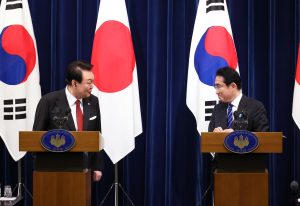A long-standing legal axiom holds that courts should render similar decisions in similar cases. In a rule-based society, judicial consistency is paramount in preserving the rule of law and avoiding disarray. This principle is even more relevant when litigation involves multiple nations, as a unilateral verdict in one country may induce unwarranted diplomatic conflict. In that regard, and given the political ramifications of East Asia’s “history wars,” conflicting adjudications by South Korean courts over wartime disputes with Japan warrant further scrutiny.
On November 23, the Seoul High Court overturned a lower court’s decision rejecting a damages lawsuit filed by former “comfort women” against the Japanese government in 2016.
In that year, 16 plaintiffs sued the Japanese government seeking compensation of 200 million won (approximately $154,000) each for having suffered immeasurable pain while forced to sexually service Japanese troops. The Seoul District Court dismissed the case in April 2021, mainly citing sovereign immunity – a legal doctrine that exempts foreign states from civil and criminal liability.
But last month, the High Court reached a diametrically opposing conclusion. The court held that sovereign immunity did not apply in this case. It ruled that the forceful mobilization of Korean women and their sexual enslavement thereafter violated international and domestic law at the time, placing Japan’s wartime actions beyond the customary legal doctrine.
In January 2021, a separate court presiding over a similar case had adjudicated along the same lines. That court ordered the Japanese government to pay compensation of 100 million won (approximately $86,000) to each of the 12 plaintiffs, in what became the first legal triumph for Korean comfort women.
Japan refused to acknowledge the January 2021 and November 2023 rulings, invoking sovereign immunity. Tokyo officials maintain that their government is under no obligation to accept these decisions. Therefore, the two rulings were finalized as no appeals were filed by the defendant.
The High Court’s reversal has placed Japanese Prime Minister Kishida Fumio and South Korean President Yoon Suk-yeol in an awkward predicament. The two leaders have made extraordinary efforts since March to thaw relations frozen under their predecessors. While the Yoon administration has distanced itself from the recent ruling, concerns mount as the decision could again impair burgeoning bilateral ties.
This is precisely what transpired in October 2018, when the South Korean Supreme Court ruled in favor of Korean forced laborers who had filed damage suits against Japanese corporations. The administration of Yoon’s predecessor, Moon Jae-in, came close to seizing and liquidating Japanese companies’ assets in Korea when defendants refused to comply with the ruling. The events plunged Tokyo and Seoul’s relations into an icy standoff. It was only after Yoon and Kishida agreed to a “third-party settlement” in 2023 that the matter reached a relative closure.
A closure was badly needed because the South Korean courts have been as conflicted as the two governments over historical issues. Notably, the 2018 precedent established by South Korea’s top court was challenged three years later. Presiding over another forced labor case in January 2021, a district court this time sided with the defendant, contending that the labor mobilization question had been settled under the 1965 Agreement.
The implications of such judiciary flip-flopping are profound.
First, South Korea’s erratic court rulings and disharmony in the justice system jeopardize Japan and South Korea’s bilateral ties. With North Korea and China’s rising military profile in Northeast Asia and the rapidly shifting geopolitical landscape, Tokyo and Seoul’s cooperation is ever more crucial. While judicial independence is important, South Korea’s executive and legislative branches should not be held hostage to courts’ seemingly arbitrary and sporadic decisions. This applies even more so to questions of this magnitude involving basic principles of law.
Second, the politicization of the South Korean courts, particularly in cases involving Japan, leaves parties to the litigation in a vulnerable position. South Korean courts appear willing to cater to national sentiment on certain cases, but this only increases political discord. A court ruling cannot fundamentally be a “flip of a coin” gamble, where a decision is susceptible to radical changes based on the ideological and political alignment of judges and the president at the time.
The Yoon administration is largely ignoring the November ruling while upholding the 2015 comfort women deal. But should the liberal Democratic Party win the next presidential election, there is a strong likelihood that the South Korean government will attempt to enforce court orders against Japan. Given the contentious nature of the claims, this is a recipe for national and international chaos.
The 2018 Supreme Court ruling wreaked havoc on Tokyo and Seoul’s relationship, and the latest High Court ruling carries the same potential. This should convince us that inter-state disputes are better resolved via diplomacy than judicial decree.
Likewise, dragging historical debate into the legal sphere, thus turning a historical inquiry into politicized litigation, risks undermining core and shared democratic values. Historical interpretation is a matter of civil and academic discourse, not courtroom standoffs.
To preserve the rule of law in East Asia and allow like-minded allies to meet existential challenges head-on, South Korean courts must be consistent in following basic legal principles. Stability in the judicial sphere is the sine qua non for a strong response by democratic neighbors in an increasingly lawless neighborhood.
































